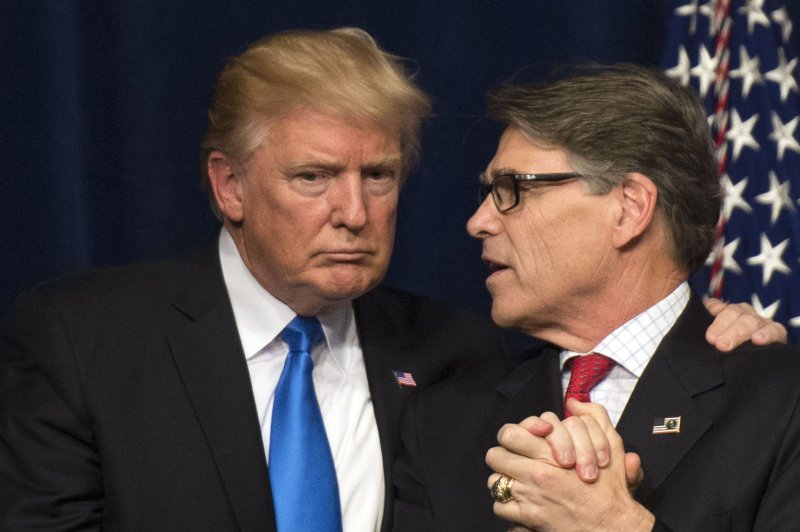Efforts by President Donald Trump (L) and Energy Secretary Rick Perry to prop up traditional power sources in the United States may jeopardize strides made already for renewables, a trade group says. Photo by Kevin Dietsch/UPI |
License Photo
Oct. 2 (UPI) -- A proposal to address what the Trump administration outlined as threats to traditional energy sources is counterintuitive, sustainable energy supporters said.
The U.S. Department of Energy said last week it was calling on the Federal Energy Regulatory Commission to change how the wholesale electricity sector works by offering compensation for "traditional" power generators.
In a letter to FERC, U.S. Energy Secretary Rick Perry said there's been a "significant" loss to traditional baseload generation over the last six years. According to Energy Department estimates, about 37 gigawatts worth of coal power was retired over the period and 34.4 GW more is under threat. The next largest set of planned retirements will come from the nuclear power sector, the department said.
"Our economy, government and national defense all depend on electricity," Perry's letter read. "Therefore, ensuring a reliable and resilient electric supply and corresponding supply chain are vital to national security."
In May, President Donald Trump signed a measure to review former President Barack Obama's Clean Power Plan, lift a short-term ban on leasing federal land for coal production, lift limits on coal production and return energy production authority to the states.
The Clean Power Plan, the centerpiece of Obama's climate change agenda, set a goal of cutting carbon emissions by 32 percent of their 2005 baseline by 2030. Perry said the order by Trump was the first step of a plan to make the United States not just energy independent, but "energy dominant."
By April, the energy secretary was calling for an investigation into the resilience and reliability of the nation's energy grid. With renewable resources like solar and wind deemed variable because of the nature of their power origins, the secretary said the issue was a critical one given regulatory burdens enacted by previous administrations that could impact legacy resources like coal-fired power generation.
The Business Council for Sustainable Energy countered that Perry's latest effort failed to consider gains in affordability and reliability already apparent as the market adapts to a growing portfolio of clean energy.
"The DOE grid resiliency pricing proposal could jeopardize this approach," BCSE President Lisa Jacobson said in a statement.
Traditional coal belts in the United States have faced economic strains in the changing energy landscape. The U.S. position as a solar panel producer has also faded. The United States had a dominant position in the solar energy sector in 1995, manufacturing 43 percent of the world's solar panels. As of 2015, six of the top 10 leaders for the global market share of solar modules were Chinese. First Solar was the only U.S. company to make the top 10 list that year.
An annual report from the American Wind Energy Association found first quarter U.S. installations of wind power reached 2,000 megawatts, quadruple the capacity from one year ago. By state, Texas, the No. 1 oil producer in the United States and Perry's home state, had the most installed wind power capacity on the grid and the most in the first quarter with 724 megawatts.
Perry added that recent weather-related outages, most recently from Hurricanes Harvey, Irma and Maria, highlighted the strains on the energy sector.
"Much work needs to be done to preserve these fuel-secure generation resources that have the essential reliability and resiliency attributes needed to keep the lights on for all Americans in times of crisis," his letter read.















